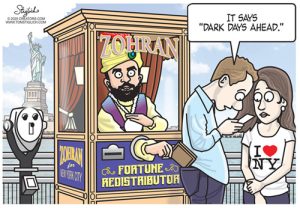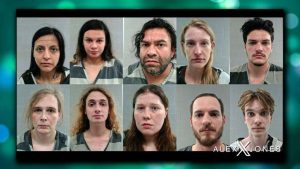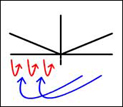“Nicaragua Betrayed” Summary— Chapter 10: The Letter
by Edward Ulrich
News of Interest.TV
February 18, 2011
This chapter describes a meeting Anastasio Somoza had with the President of Venezuela Carlos Andres Perez, who told Somoza that he is “too soft of a dictator” and essentially that he was going to overthrow him; also explained is the contents of a confidential personal letter Somoza received from Jimmy Carter that deceptively gave an initial impression of Carter being willing to be cooperative with him.
Following are key points from the chapter:
— Somoza says, “As of July, 1978, conditions have not improved. No matter how hard I tried, it seemed there was no way to please the United States. With Venezuela, Panama, and Costa Rica, my position had deteriorated. This is to say that they were assisting the Sandinista terrorists even more than they had in the past. We were also aware of the fact that Fidel Castro had accelerated his program of aggression against Nicaragua, because more arms, ammunition, and Cuban-trained personnel were arriving.”
— Somoza had a meeting with U.S. Ambassador Solaun, who gave him a personal letter from Jimmy Carter but was told the contents of the letter could not be made public. Somoza says, “The contents of the letter, if publicly known, could assist me greatly in warding off my other enemies. I was not interested in a collector’s item and, without being able to use the letter publicly, that’s what it was. To prove my point, that letter from President Carter to me is reproduced herein and in its exact content.”
— Somoza explains that he worked hard to try to establish good relations with Carlos Andres Perez, the President of Venezuela, and he was able to have a meeting with him in Venezuela. A plane was sent and brought Somoza to the island of Orchilla where Perez liked to entertain. Following are excerpts of his accounts:
For three hours, I gave [Perez] an accurate evaluation of the situation in Nicaragua. I wanted Perez to understand that at stake was far more than Somoza and his political future. So details were given as to the strength of the Sandinistas, the source of their training and equipment, the number of Cuban-trained Communists involved, and the influence being put forth by the Communists to take over Nicaragua.
I then told [Perez] that at least some of the things I was doing in Nicaragua were pleasing to President Carter. Without revealing the details of the letter, it was disclosed that a letter had been received from Carter and in that letter he expressed the opinion that I was doing a good job. Perez came back with an unyielding retort: “I don’t care what Carter says. Our position is firm and you have to go.” This statement was as strong as one president can make to another president. In essence, he was telling me that he was going to have my head and that he had the power to take it. I thought back to those days when he was secretary to Betancourt, an avowed Communist, and I was an aide to my father. This was his time for revenge and he was going to make the most of it.
[Somoza explains to Perez that he was elected by the people of his country just like Perez was, and there is absolutely no reason to go through a violent situation, and Perez told him, “I think it’s too late to negotiate,” and Somoza replied, “It’s never too late to talk and negotiate.” Perez then said he would speak to certain people in Nicaragua to see if they would accept the idea of negotiation. Perez said that he could offer the Somoza family guaranteed safety and property rights on the provision he vacated the Presidency. Somoza explains that the Perez group would have raised the money to purchase his holdings in Nicaragua which would have left him far better off financially than he is now, but he was not interested in such offers. Somoza says, “For me, there was one intrinsic value which was more important than anything else. I had to keep the Communists from taking Nicaragua.”]
[Perez] was, I determined, a shallow man who really didn’t understand the functions of government. To his way of thinking, free elections in Latin America were a facade. ...
...
At one point in the conversation, I remember Perez telling me that he knew what my problem was. He said: “You know, Somoza, your problem is that you are a soft dictator, and soft dictators can’t get the job done. In Latin America,” he continued, “the only successful dictators are the hard ones.”
...
Another point became evident, he was not a well-informed man. Most of his knowledge was empirical, and that knowledge was limited. He seemed to resent those who had University training and education. That, I thought, is a defense mechanism because Perez only finished high school.
...
When we were returning to Managua, my minister and I had a serious and depressing conversation. It was his opinion that I did not convince Perez to withdraw his effort to overthrow me. I concurred in that opinion. I returned to Nicaragua a sad man.
— Somoza explains issues concerning a personal letter he received from President Carter:
The letter from President Carter came at a time when I needed encouragement, and particularly from the United States. I accepted this letter in good faith and presumed it had been written on a good-faith basis. Long ago I should have learned that when dealing with Mr. Carter, good faith, logic, and reasoning had no meaning at all.
...
In reality, this letter was a ruse and a ploy. When the letter was written, it was anticipated that, as a result of the friendly tone, I would cooperate with those forces which were determined to destroy me and the government of Nicaragua. This is not an opinion or a prejudiced conclusion, it’s a fact.
The deceit of Mr. Carter is unbelievable. He wrote me a nice letter on June 30, 1978 which, in essence, outlined the favorable conditions in Nicaragua and, to his way of thinking, the good work I was doing. Then on July 23, 1978, the “Washington Post” quoted the Carter Administration as saying:
“We told Somoza that if he reimposes the state of siege, closes opposition papers, or arrests opposition political leaders, the U.S. Ambassador will be recalled and we might break relations. We are not intriguing against any opposition faction. The fact is, we’re against Somoza.”
It would be well to take a look at that famous letter which Mr. Carter had Ambassador Solaun deliver to me.
THE WHITE HOUSE
Washington
June 30, 1978
Dear Mr. President:
I read your statement to the press on June 19 with great interest and appreciation. The steps toward respecting human rights that you are considering are important and heartening signs; and, as they are translated into actions, will mark a major advance for your nation in answering some of the criticisms recently aimed at the Nicaraguan government.
I am pleased to learn of your willingness to cooperate with the International American Commission on Human Rights. I believe that multilateral institutions can be a most appropriate and effective means of protecting human rights and alleviating concerns expressed about them. I sincerely hope that your government can rapidly reach agreement wit the Commission on a date for their visit.
The Commission will be favorably impressed by your decision to allow the members of the so-called “Group of Twelve” to return to peaceful lives in Nicaragua. The freedoms of movement and expression that are at stake in this case are among the central human rights that the commission seeks to protect.
You have spoken about a possible amnesty for Nicaraguans being held in jail for political reasons. I urge you to take the promising steps you have suggested; they would serve to improve the image abroad of the human rights situation in Nicaragua.
I was also encouraged to hear your suggestions for a reform of the electoral system in order to ensure fair and free elections in which all political parties could compete fairly. This step is essential to the function of a democracy.
I would also like to take this opportunity to encourage you to sign and ratify the American Convention of Human Rights. I have signed this agreement and am working hard to have my country ratify the Convention.
I look forward to hearing of the implementation of your decisions and appreciate very much your announcement of these constructive actions. I hope that you will continue to communicate fully with my Ambassador, Mauricio Solaun, who enjoys my complete confidence.
Sincerely,
JIMMY CARTER (Signature)
His Excellency
General Anastasio Somoza Debayle
President of the Republic of Nicaragua
Managua
...
It is quite obvious but it should be pointed out that in this one letter, Mr. Carter mentions “human rights” six times. That was his vehicle for the destruction of me and the government and he would ride this phony issue until the day the Marxists took over Nicaragua. It is now recognized that on human rights, Carter’s creation of calamity, Nicaragua fared as well, if not better, than any country in Latin America. It just so happened that Mr. Carter and his coterie of Leftists were determined to depose me and the government of Nicaragua, and the issue of Human Rights served their purpose.
I was somehow surprised that he praised me for permitting the “Group of Twelve,” as he put it, to “return to peaceful lives in Nicaragua.” That subversive group was permitted to return to Nicaragua due to the immense pressure from the United States. Mr. Cater knew they were preaching armed revolution and, yet, he and the State Department placed me in a position where I had to permit their return. It has now been publicly revealed that the “Group of Twelve” was actually part and parcel of the Sandinista movement. I knew that in 1978 but there was no way I could convince the State Department of the U.S. or President Carter.
When I first read the letter, I should have paid closer attention to the following sentence: “You have spoken about a possible amnesty for Nicaraguans being held in jail for political reasons.” Again, deviousness rears it’s ugly head. Mr. Carter is referring to people who were tried in an open court and law and were convicted of various felonies. The human rights people called them “political prisoners,” not I. If Mr. Carter had checked with the citizens of Nicaragua, he would have learned that the government didn’t throw people in jail for political beliefs. In my desire to get along with the United States, I had agreed to consider amnesty for certain of those people who “they” said were political prisoners.
...
In the quiet atmosphere of my home office, I reread Mr. Carter’s letter and I recalled that, according to the media and the human rights people, Nicaragua was holding thousands of political prisoners. What a monstrous lie that was. When the Communist terrorists captured the National Palace and demanded the release of all political prisoners [explained in the next chapter], they could come up with only fifty-nine people. The record will reveal that all of those were convicted felons— with some being admitted murderers. But Mr. Carter, the U.S. State Department, and the Human Rights Commission wanted amnesty granted to all those criminals. Mr. Carter made that very clear in his letter to me.
... While praising my efforts to satisfy the United States, Mr. Carter was stepping up his attack against me and the government of Nicaragua.
...
I learned later that Perez had double-crossed me. He had my word that I would divulge nothing which happened at the meeting, nor would I reveal that such a meeting had been held. I kept the word. For Perez, though, the secrecy agreement was unilateral. Which really meant that he could tell about the meeting but I couldn’t. From a source inside the State Department, I learned that my plane had hardly become airborne when Perez dashed off a message to President Carter. In this secret message, he not only related details of the meeting but gave President Carter a totally erroneous report. He said that I was adamant, intransigent, and impossible to deal with. He indicated to Carter that he tried to find a common ground from which a compromise could be effected, but with Somoza there was no way to compromise. This should serve as a caveat to all those who think presidents will not lie. This is an example of duplicity, double-dealing, and back-stabbing at the highest level of government. Carlos Andres Perez, President of Venezuela and Carter’s man in the South, proved to be a double-crosser and a liar.
Purchase the book “Nicaragua Betrayed” from Amazon.com.








